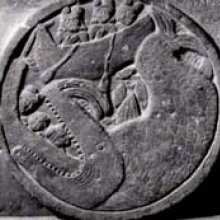Timingala, Timiṅgala: 5 definitions
Introduction:
Timingala means something in Hinduism, Sanskrit, Buddhism, Pali. If you want to know the exact meaning, history, etymology or English translation of this term then check out the descriptions on this page. Add your comment or reference to a book if you want to contribute to this summary article.
Images (photo gallery)
In Hinduism
Ayurveda (science of life)
Source: Wisdom Library: Āyurveda and botanyTimiṅgala (तिमिङ्गल) is a Sanskrit word referring to the animal “estuarine crocodile”. The meat of this animal is part of the māṃsavarga (‘group of flesh’), which is used throughout Ayurvedic literature. The animal Timiṅgala is part of the sub-group named Vāriśaya, refering to animals “living in waters”. It was classified by Caraka in his Carakasaṃhitā sūtrasthāna (chapter 27), a classical Ayurvedic work. Caraka defined such groups (vargas) based on the dietic properties of the substance.
Source: archive.org: Sushruta samhita, Volume ITimiṅgala (तिमिङ्गल)—Sanskrit word for a fish; a species of large whales (fabulous). This animal is from the group called Sāmudra-matsya (‘marine fish’). Sāmudra-matsya itself is a sub-group of the group of animals known as Ānupa (those that frequent marshy places).

Āyurveda (आयुर्वेद, ayurveda) is a branch of Indian science dealing with medicine, herbalism, taxology, anatomy, surgery, alchemy and related topics. Traditional practice of Āyurveda in ancient India dates back to at least the first millenium BC. Literature is commonly written in Sanskrit using various poetic metres.
General definition (in Hinduism)
Source: Lehrstuhl für Indologie: Stories of Trading Merchants and VasudevahiṇḍīIn the Jain canonical work the Nāyādhammakahāo (17) ships were also attacked by whales of enormous size known as timiṅgala (“swallowing the ocean”), and other water animals which could not be prevented by beating drums or burning fire (Guṇacandragaṇi’s Kahārayaṇakosa, Sujayarājarṣikathānaka).
Languages of India and abroad
Pali-English dictionary
Source: BuddhaSasana: Concise Pali-English Dictionarytimiṅgala : (m.) a kind of fish.
Source: Sutta: The Pali Text Society's Pali-English DictionaryTimiṅgala, (timi+gila, gl, see note on gala) in combination w. timi, timitimiṅgala. Sk. has timingila & timingilagila: redupl. in 2nd syllable where P. has redupl. in 1st; fisheater, redupl. as intens. =greedy or monstrous fisheater, a fabulous fish of enormous size, the largest fish in existence Vin. II, 238=A. IV, 200=Nd2 2353q; Ps. II, 196; Miln. 377. At Ud. 54 sq. & Miln. 262 we find the reading timi timingala timirapingala, which is evidently faulty. A Sanskritized form of t. is timitimingala at Divy 502. See timiratipingala, & cp. also the similar Sk. cilicima a sort of fish. (Page 303)

Pali is the language of the Tipiṭaka, which is the sacred canon of Theravāda Buddhism and contains much of the Buddha’s speech. Closeley related to Sanskrit, both languages are used interchangeably between religions.
See also (Relevant definitions)
Ends with: Timitimingala.
Full-text: Timi, Timiratipingala, Ajjhohara, Matsyabandha, Varishaya, Gala.
Relevant text
Search found 6 books and stories containing Timingala, Timiṅgala; (plurals include: Timingalas, Timiṅgalas). You can also click to the full overview containing English textual excerpts. Below are direct links for the most relevant articles:
Maha Prajnaparamita Sastra (by Gelongma Karma Migme Chödrön)
Appendix 3 - Identification of Makara, king of the fish (matsyarāja) < [Chapter XIII - The Buddha-fields]
Appendix 2 - The legend of Dharmaruci < [Chapter XIII - The Buddha-fields]
Vinaya Pitaka (3): Khandhaka (by I. B. Horner)
Eight wonderful things about the great ocean < [19. Suspending the Observance (Uposathaṭṭhāpana)]
Eight wonderful things about this Dhamma and Vinaya < [19. Suspending the Observance (Uposathaṭṭhāpana)]
Vinaya (3): The Cullavagga (by T. W. Rhys Davids)
Cullavagga, Khandaka 9, Chapter 1 < [Khandaka 9 - On Exclusion from the Patimokkha Ceremony]
The Devi Bhagavata Purana (by Swami Vijñanananda)
The Great Chronicle of Buddhas (by Ven. Mingun Sayadaw)
Part 4 - The Week at the Golden House (Ratanāghara Sattāha) < [Chapter 8 - The Buddha’s stay at the Seven Places]
The Bhagavata Purana (by G. V. Tagare)
Chapter 10 - A Battle between Gods and Asuras < [Book 8 - Eighth Skandha]
Chapter 7 - The Churning of the Sea for Nectar < [Book 8 - Eighth Skandha]
